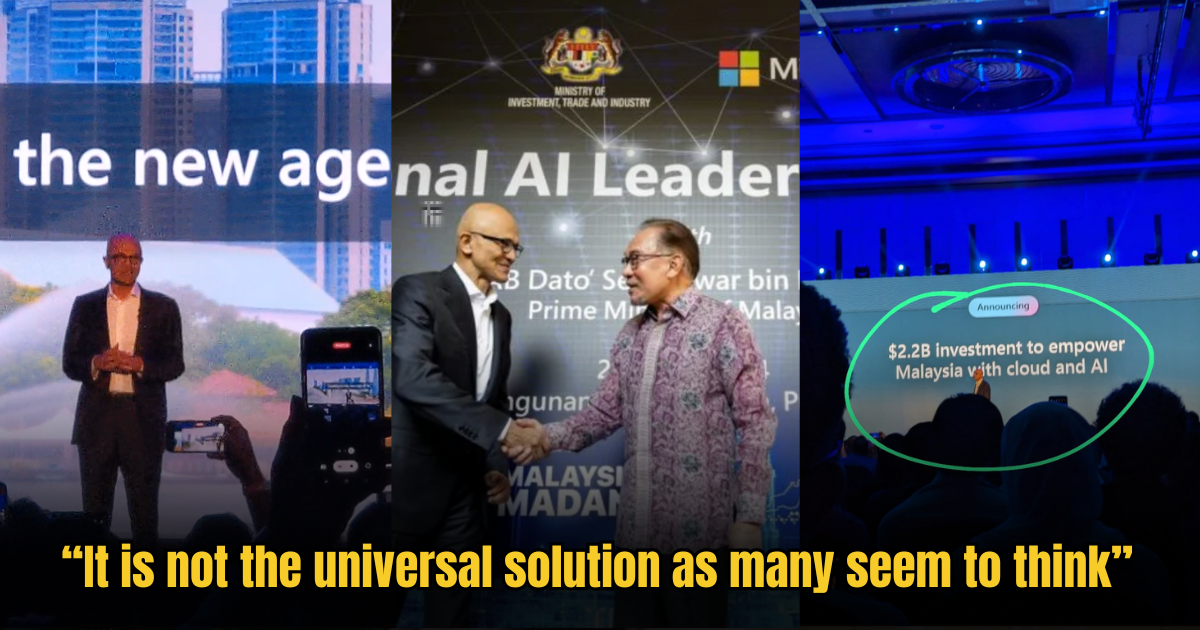Disclaimer: In Real Life is a platform for everyday people to share their experiences and voices. All articles are personal stories and do not necessarily echo In Real Life’s sentiments.

In recent news, Microsoft has announced that it will invest 2.2 billion USD (RM10.5 billion) into Malaysia to develop its cloud and AI transformation. Experts say that this massive investment will be a game-changer for Malaysia’s economic growth across the country.
For job seekers seeking a bright career, the glamour of tech giants like Facebook and Google coupled with the allure of 5-figure salaries have inspired many to pivot careers in hopes of gaining financial freedom.
But is the reality of the tech industry as rewarding as it seems?
A mismatch between tertiary education and industry
According to a report by ResearchGate, educational institutions have failed to keep pace with industry developments, leaving graduates poorly prepared for real-world coding jobs.
“As someone self-taught, I’ve seen computer science students who were only taught C and C++ in university, and have never been exposed to Ruby or Python,” shared Zul, a web developer working for a US company while based in Malaysia.
“There’s a lot of old school professors out there that haven’t worked in a tech company in 20 years, and they’re teaching the kids a bunch of outdated methodologies,” he shares.
“I’m watching my cousin’s kid do a mid-career switch to UX with only a bootcamp certification, and she’s honestly killing it,” he added.
Soft skills are crucial yet overlooked
Critics argue that there’s a notable gap between what is taught in computer science programs and the skills actually needed in the workplace. This disconnect between tertiary education and current industry demands has led to many prospective coders feeling ill-prepared for the job search.
Rui He, who studied a Bachelors in Computer Science, found that she was stuck in an engineering “problem solving” mindset that made her “uncreative” and “insufficiently empathic” to users.
“They never tell you that the soft skills matter just as much if not more than the degree. When I graduated I couldn’t get a job, because my lack of communication skills coupled with my junior level of hard skills made it hard for me to adapt to the working culture.
“Many people wrongly assume that you don’t need to be a people person to work in tech. On the contrary, your ability to communicate across teams with different specialities is the most important skill to have, even if all you do is work with code all day,” she added.
Rui He learned the hard way that the journey from novice to professional in the tech world is not merely a matter of acquiring hard skills like coding. Soft skills, which include teamwork, empathy, and adaptability, play a crucial role yet are often underestimated by those entering the field.
Career switching is risky for those above 35
For those transitioning into programming later in life or from unrelated fields, the barriers can be formidable.
35-year-old Suresh made a career switch to programming from being a marketing manager at a local SME.
After seeing the impact of ChatGPT and AI, he took the plunge and went for a 4-month bootcamp. However, once he put his resume out there in the job market, he found himself in a frustrating catch-22 situation.
“I was told I was “too experienced” for entry-level roles. And yet, when I applied to senior roles, I was told I was “not experienced enough” for anything but entry level work.”
Regardless, Suresh was looking forward to building his career from the bottom up. But he found out that the timing of the market just wasn’t good for him.
“According to my friends in the industry, we’re in a layoff cycle now. They’re only keeping those in mid-career to senior roles, and remote workers are often the first to go. So I just gave up and refocused on my existing career.”
Suresh’s experience is typical of many who have been affected by the impact of economic downturns in the tech sector. The frequent hiring and firing, sometimes within 3 to 6 months, disproportionately affect newcomers to the industry, regardless of their qualifications.
The mental strain of programming jobs that nobody tells you
Another individual, who wishes to remain anonymous for this article, shares how after a decade in coding, they encountered only minimum wage positions that ultimately led to job loss due to burnout and ADHD.
“I spent 10 years coding. In all that time, I’ve only managed to get crappy entry-level coding jobs. I was constantly overworked by superiors who didn’t care about my health, and I frequently experienced burnout.
“I have never been able to hold down a programming position for longer than a year. After being diagnosed with ADHD, I realised this industry is too stressful and was making my condition worse.”
“Now I’m switching careers to biological sciences. I don’t care about the money any more. I just want work-life balance.”
This person’s unfortunate experience points to a feature in the tech industry that isn’t mentioned: Its human capital is vulnerable to being exploited by unscrupulous employers, leading to burnout, particularly among those in lower-tier positions.
A bright future or a career trap for M’sia’s job seekers?
The tech industry is often portrayed as a meritocracy where skill and hard work guarantee success. However, issues such as ageism, bias against career changers, and economic cycles of booms and busts show that it is not immune to the same challenges that plague other high-income industries.
For many, the reality of a programming career involves navigating a complex landscape of overhyped expectations, economic volatility, and personal suitability to the job.
“I admit that I went into this field thinking I could earn a 5-figure salary within 2-3 years. But it is not the universal solution as many seem to think,” shared Suresh.
“If you are looking to become a coder, my advice is to really brutally assess not just your own coding skills, but also how you fit in with the culture,” said Rui He.
In summary, while programming can be a lucrative and fulfilling career, it is not without its challenges and pitfalls. For those looking to switch careers into this field, do your research, and good luck!
What do you think of this story?
Share your thoughts in the comments!
Submit your story to ym.efillaerni@olleh and you may be featured on In Real Life Malaysia.
Read also: Why I Changed Careers From Corporate To Veterinarian
More from Viral News
“I Miss My Home,” Shares M’sian Cosplayer Who Lost Everything in Putra Heights Explosion
This story is about Elizabeth Mae Hendroff, a Malaysian content creator and cosplayer whose life was turned upside down by …
“The Windows Were Shaking” Victims of the Putra Heights Gas Fire Share Their Firsthand Experiences
Residents of Putra Heights recall their narrow escape from a 30-meter high inferno that erupted from a gas leak in …
“RM15 For Roti John? Even McD Cheaper Lah,” Shares M’sian Shocked By Ramadan Bazaar Prices
Every Ramadan, Malaysians look forward to the festive bazaars selling mouthwatering dishes, from ayam percik to murtabak. But this year, …















